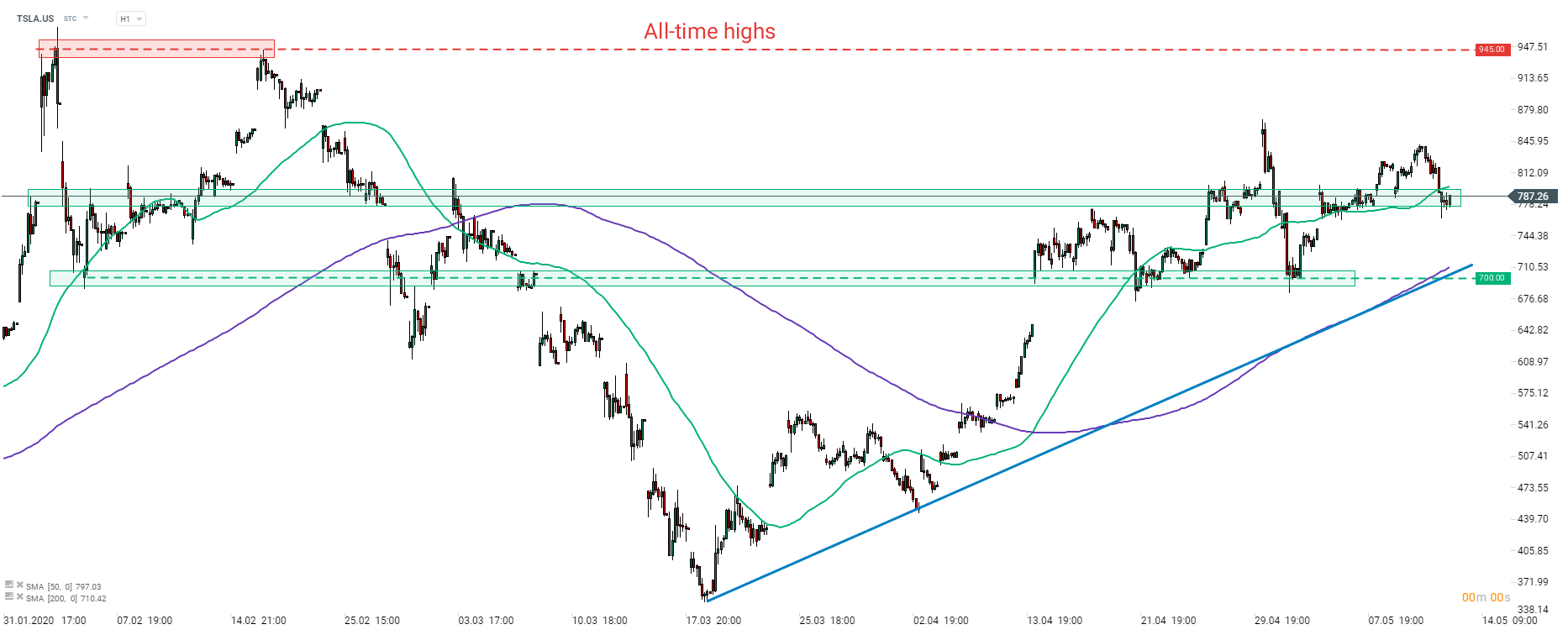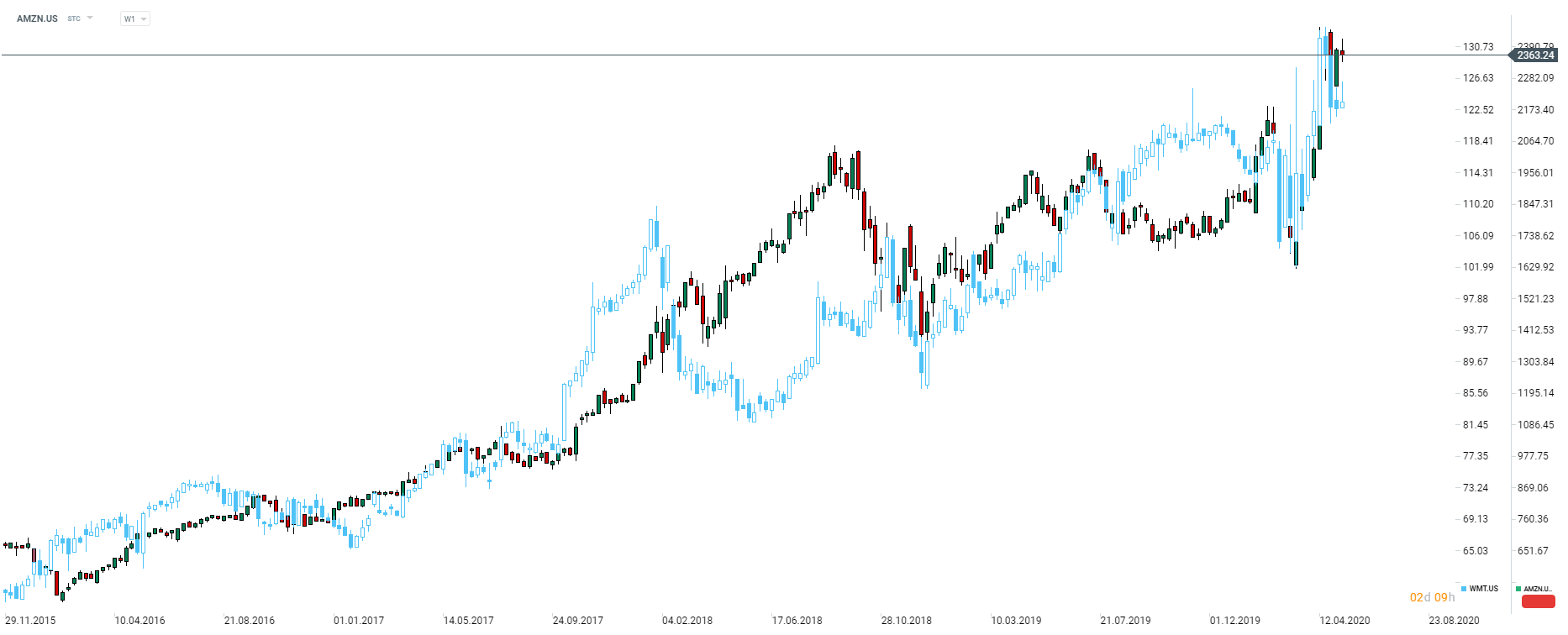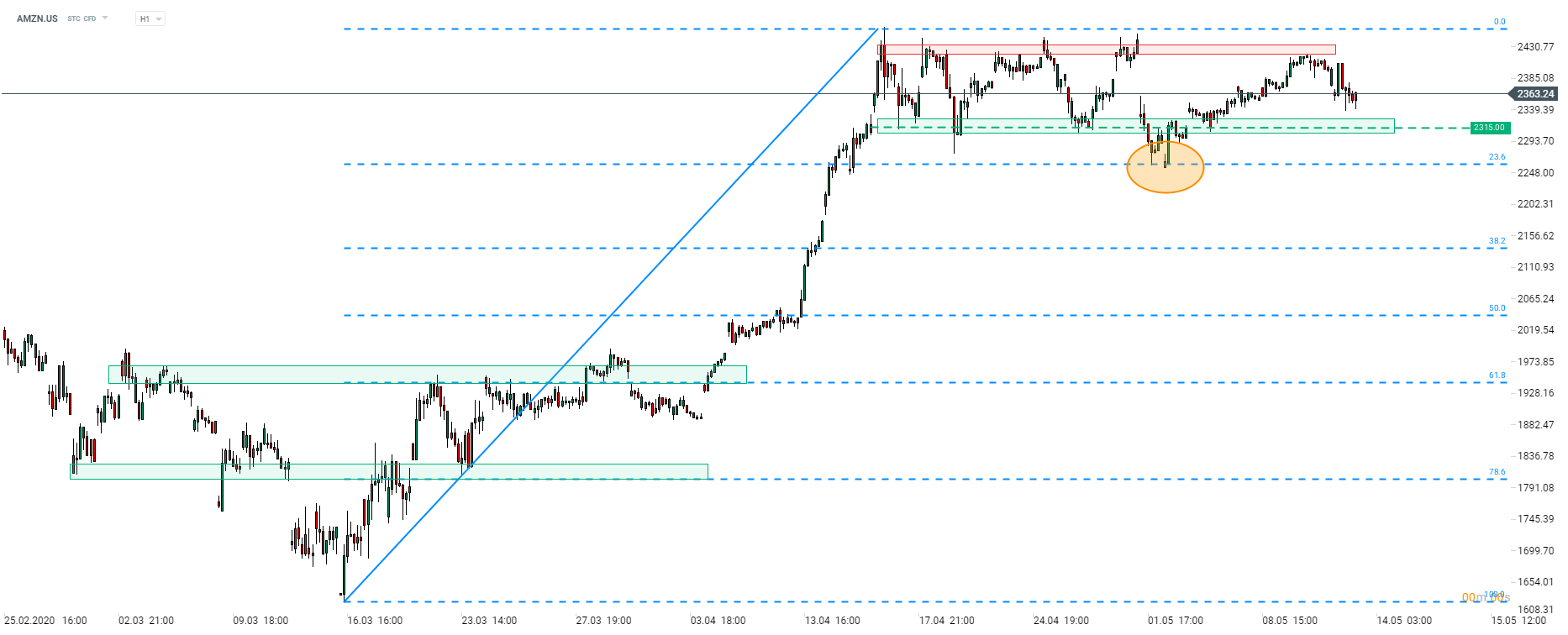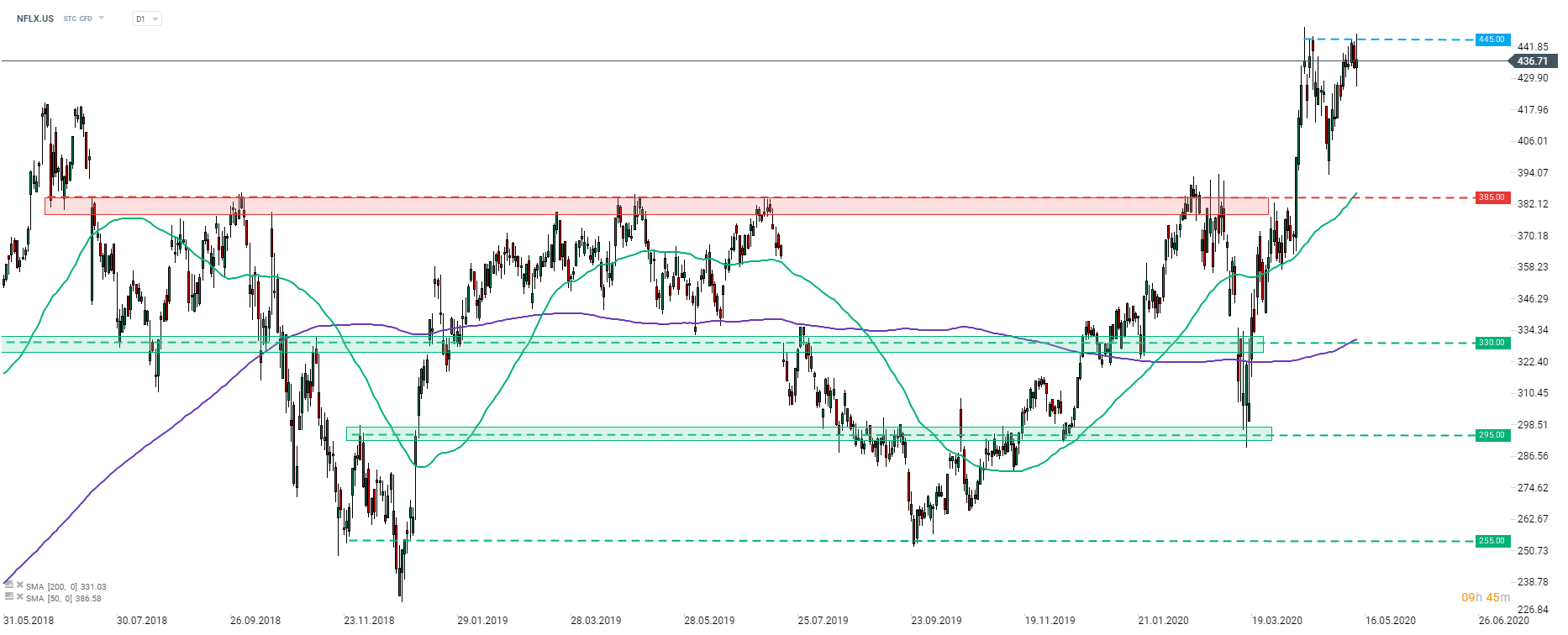-
Are pioneers better positioned for success than their traditional rivals?
-
Traditional carmakers embrace electric vehicles
-
E-commerce will not push brick-and-mortar retailers out of market
-
Entertainment companies launch their own streaming platforms
Coronavirus pandemic and its implications highlighted what's been known for years - technology is one of the most important drivers of growth in the global economy. Just imagine locking down the world's most developed economies 20-30 years ago. All of those who work from home at the moment would probably be unable to do their jobs as computers were not as affordable and widespread as they are today. Economic damage from such a move would be so much bigger that it probably wouldn't even be considered. But looking at things on a micro scale, do companies who have focused on technology really have an edge over their more "traditional" competitors? In this commentary we will take a look at 3 pairs of stocks that operate in the same sector but their business approach is way different.
Carmakers: Tesla vs Volkswagen
In the first pair we have Volkswagen, the world's biggest car manufacturer, and Tesla, electric vehicle manufacturer headed by an outspoken fossil fuel critic Elon Musk. Pressure to adopt a more environmentally friendly way of life and of conducting business has been on the rise in recent years and is unlikely to abate soon. Electric vehicle sales are increasing and major old-school carmakers are developing portfolios of EV models. In short, EV revolution is a fact. Of course, Tesla has a head start as it was focusing on those types of vehicles since its inception. However, size also matters. Tesla may be equal or even bigger than Volkswagen in terms of market cap but the two companies are not equal in terms of operations.
Volkswagen delivered almost 30 times more vehicles in 2019 than Tesla! Tesla is a young company and is growing rapidly but such a gap would be hard to close for years. Volkswagen has more production plants, widespread distribution networks and, most of all, an experience in playing on a large scale. In spite of a Dieselgate scandal, Volkswagen still has a strong capital position and is a profitable company. It is not a problem for the German company to afford a big R&D team. On the other hand, Tesla is pressured by a mountain of debt and while it managed to turn some profit, demand collapse caused by Covid-19 may push it back into the red. Summing up, Tesla has a head start and made its name as EV manufacturer but in a longer term, traditional carmakers will likely catch up and possibly dwarf Tesla with their EV operations thanks to bigger resources and less leverage (this is an advantage that could help company weather ongoing crisis).
 Tesla (TSLA.US) is one of the most volatile major US stocks this year. After rising over 100% in the first months of the year, it has slumped more than 60% during the coronavirus sell-off. Another 100+% rally followed later on. Stock retested support zone ranging below $800 yesterday but is likely to drop below it on today's risk-off moods. Source: xStation5
Tesla (TSLA.US) is one of the most volatile major US stocks this year. After rising over 100% in the first months of the year, it has slumped more than 60% during the coronavirus sell-off. Another 100+% rally followed later on. Stock retested support zone ranging below $800 yesterday but is likely to drop below it on today's risk-off moods. Source: xStation5
Retailers: Amazon vs Walmart
In the next pair of stocks we have two well-known retailers - Walmart and Amazon. Both companies offer almost everything you might need in your life. However, their business models are different. Walmart focuses on brick-and-mortar shops while Amazon is an online retailer. Both benefited from the Covid-19 pandemic as Walmart experienced stockpiling demand while Amazon benefited from an increased interest in e-commerce. But how will businesses of the two companies change after pandemic recedes? In fact, they may not change that much.
Of course, the e-commerce boom we are observing right now is likely to change habits of at least some consumers and encourage them to shop online even once it will be completely safe to go outside. However, it is unlikely that e-commerce will push brick-and-mortar retailers out of business completely. Why? Note that any online purchases of real goods (i.e. not services, e-books etc) requires delivery time. Intraday deliveries are being offered by some online retailers but intraday does not mean instant - simply, there are things we may need right now, not in 2-3 hours. In such a situation, it will be a no-brainer decision to go to a nearby shop rather than buy online and wait for a courier. Because of that brick-and-mortar retailers that sell necessities, like for example groceries, are here to stay.
 Both Amazon (AMZN.US) and Walmart (WMT.US, light blue overlay) enjoyed strong growth over the past 5 years. However, Walmart share price increased by ca. 100% while Amazon stock rallied over 400% in the period! Source: xStation5
Both Amazon (AMZN.US) and Walmart (WMT.US, light blue overlay) enjoyed strong growth over the past 5 years. However, Walmart share price increased by ca. 100% while Amazon stock rallied over 400% in the period! Source: xStation5
It is true that e-commerce companies can expand cheaper as they do not need to set up brick-and-mortar stores in new markets. However, they still need to build warehouses but so do traditional retailers. One thing that may cause online retailers stock to outperform compared to traditional retailers is technology. Amazon has been focused on technology since its inception and expertise in this field allowed it to branch out to new segments, with AWS cloud business being the best example. Importance of AWS in Amazon's revenue breakdown is increasing each quarter. Apart from that, diversification of revenue stream is desirable.
 Amazon (AMZN.US) stock has rallied around 50% off the March's low and began to trade sideways later on. Lower limit of the range at $2,315 is the first support to watch while 23.6% retracement of the recovery rally can be seen as the next one in line. Stock tested this hurdle at the start of the previous week but bears failed to break above (yellow circle). Source: xStation5
Amazon (AMZN.US) stock has rallied around 50% off the March's low and began to trade sideways later on. Lower limit of the range at $2,315 is the first support to watch while 23.6% retracement of the recovery rally can be seen as the next one in line. Stock tested this hurdle at the start of the previous week but bears failed to break above (yellow circle). Source: xStation5
Entertainment: Netflix vs Walt Disney
In the last pair we have two entertainment companies - Netflix and Walt Disney. Walt Disney is a well-known company in the entertainment industry and is associated with TV channels, movies and theme parks among others. Netflix, on the other hand, is one of pioneers in video streaming services. Both companies are producing movies and series but the difference lies in how they distribute them. For years Disney movies were reasons for families to go to cinemas at weekends. Meanwhile, Netflix allows on-demand access to its movie portfolio from home.
At least, this is how things were before November 2019. Disney+, streaming services of Walt Disney, was launched during that month. On one hand, this is an acknowledgement that Netflix's way is the right way. On the other hand, it means that Netflix's bonanza is over and competition will be tougher. Entertainment companies like Netflix and Walt Disney are perfect examples of how ways of doing business in particular industries converge over time. Walt Disney operates theme parks, runs some TV channels and screens its movies in theatres but that's almost all it differs in from Netflix. Both companies make movies and series and both plan to focus on their own streaming platforms in the future as the premier venue to screen productions. As the time passes by, differences are likely to continue to narrow.
 Netflix (NFLX.US) is trading near all-time highs and around 15% above pre-crisis levels. The company benefited from the pandemic both in terms of stock performance and company's earnings. The stock jumped above $445 for a brief moment yesterday but failed to paint a fresh intraday all-time high. However, a risk for the bulls is what the company warned about - a big surge in subscribers due to Covid-19 pandemic is unlikely to last once the pandemic ends with net subscriber outflows being a possibility in the second half of the year. Source: xStation5
Netflix (NFLX.US) is trading near all-time highs and around 15% above pre-crisis levels. The company benefited from the pandemic both in terms of stock performance and company's earnings. The stock jumped above $445 for a brief moment yesterday but failed to paint a fresh intraday all-time high. However, a risk for the bulls is what the company warned about - a big surge in subscribers due to Covid-19 pandemic is unlikely to last once the pandemic ends with net subscriber outflows being a possibility in the second half of the year. Source: xStation5
Summing up, companies focusing on technology do not necessarily have an edge over their more "traditional" rivals. Technology drives changes in the way we live and, in turn, in consumer habits. Companies that do not adapt may be left behind and because of that, "traditional" players are adopting more technology in their businesses. However, while pioneers like Tesla or Netflix may have a head start, they may lose it in the future as well-known companies like Volkswagen or Walt Disney have bigger resources and better ability to catch-up. General conclusion is that most of the companies in the same industries will ultimately follow into the same direction and those that are pioneers now may not live up to competition from big "traditional" companies.
Being a pioneer is only really an advantage when you can guard your ideas with patents (i.e. biotechs). In industries where products are relatively uniform (i.e. carmakers), patent protection is not as effective. In such industries being a pioneer means you are somewhat helping your competitors by allowing them to build onto your ideas. Walt Disney branching into streaming services is a perfect example.
Daily summary: Sentiments on Wall Street stall at the end of the week🗽US Dollar gains
AbbVie near 1-month low after earnings report 📉
Wall Street optimism tempers amid falling odds of December Fed rate cut
DE40: Decline of sentiment in Europe
This content has been created by XTB S.A. This service is provided by XTB S.A., with its registered office in Warsaw, at Prosta 67, 00-838 Warsaw, Poland, entered in the register of entrepreneurs of the National Court Register (Krajowy Rejestr Sądowy) conducted by District Court for the Capital City of Warsaw, XII Commercial Division of the National Court Register under KRS number 0000217580, REGON number 015803782 and Tax Identification Number (NIP) 527-24-43-955, with the fully paid up share capital in the amount of PLN 5.869.181,75. XTB S.A. conducts brokerage activities on the basis of the license granted by Polish Securities and Exchange Commission on 8th November 2005 No. DDM-M-4021-57-1/2005 and is supervised by Polish Supervision Authority.


